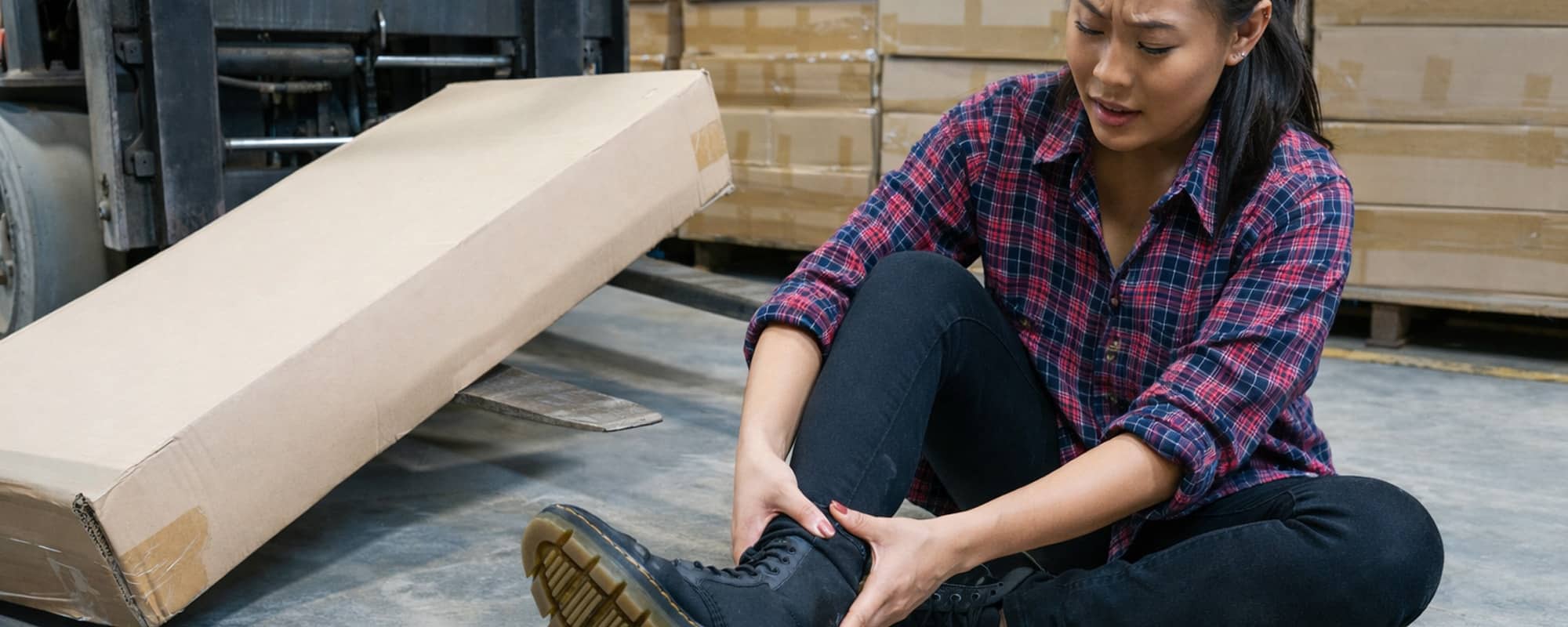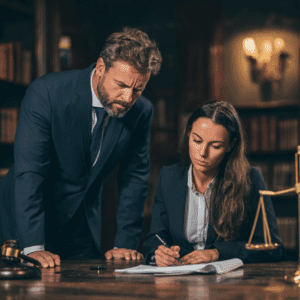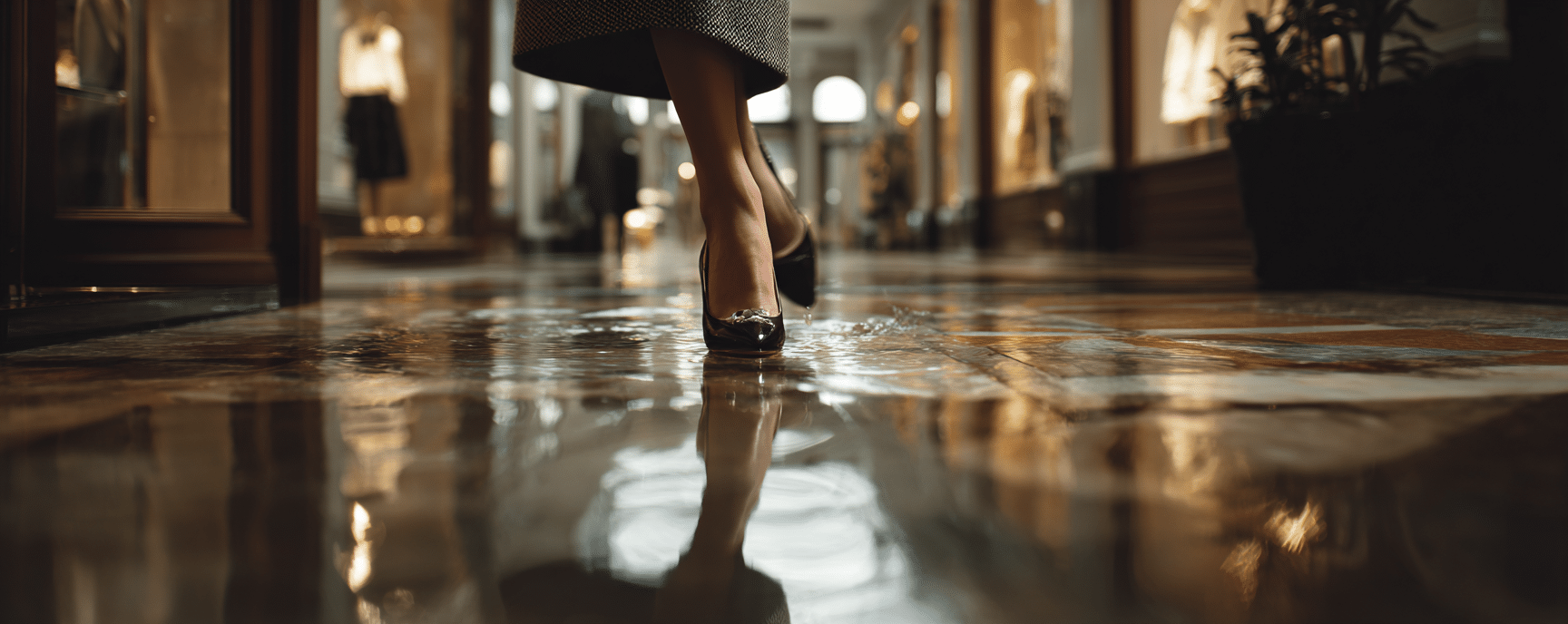
Getting injured in a slip and fall accident can change your life in seconds. Whether you slipped on a wet floor at the grocery store or tripped over broken pavement outside an office building, you may have the right to seek compensation for your injuries. Understanding how to file a slip and fall claim can help you protect your rights and pursue fair compensation after an accident on someone else’s property.
This guide explains every step of filing a slip and fall claim in South Carolina, from gathering evidence at the scene to negotiating a settlement with insurance companies.

Hurt in an Accident? Hire Maguire
Hurt? You Need Our Help
Give us a call for a FREE & CONFIDENTIAL Case Review*
Understanding Slip and Fall Claims in South Carolina
Slip and fall claims fall under premises liability law, which holds property owners responsible when unsafe conditions on their property cause harm to lawful visitors. To recover compensation, you must prove that the property owner knew or should have known about the dangerous condition and failed to correct it or warn you about it.
Property owners owe different levels of care depending on why you were on the property. Shoppers and customers generally receive the highest level of protection, while social guests receive moderate protection, and trespassers receive minimal protection under the law.
Steps to Take Immediately After Your Accident
The actions you take immediately after your fall can have a major impact on your claim.
1. Get Medical Attention
Your health should come first. Even if you feel fine at first, some injuries take time to appear. Seeing a doctor creates medical documentation that connects your injuries to the fall. Insurance companies often question claims where treatment was delayed.
2. Report the Accident
Notify the property owner, manager, or employee about your fall as soon as possible. Request that they file an accident report and ask for a copy for your records. This provides official documentation that the incident occurred.
3. Document the Scene
If you can safely do so, take photos or videos of the exact area where you fell. Capture the hazard from multiple angles, whether it’s poor lighting, torn carpet, a wet floor, or uneven pavement. Also, photograph visible injuries.
4. Gather Witness Information
Ask anyone who witnessed your fall for their contact information. Their statements can help confirm what happened and support your version of events.
5. Preserve Evidence
Keep the clothing and shoes you wore during the fall, and do not wash or repair them. They may serve as evidence. If the hazard involved a substance, note its appearance and how long it seemed to have been present.
How to File Your Slip and Fall Claim

Calculate Your Damages
Before contacting the insurance company, total all losses related to the accident — including medical bills, future medical care, lost income, reduced earning ability, pain and suffering, and property damage. Keep all supporting documentation.
Notify the Property Owner
Send a written notice to the property owner describing the accident, your injuries, and your intent to pursue a claim. Send it by certified mail for proof of delivery.
Contact Their Insurance Company
Most property owners carry liability insurance. Contact the insurer to begin the claims process. Provide only basic facts and avoid signing documents or giving recorded statements before consulting an attorney.
Submit Your Claim Package
Include copies of the accident report, medical records, bills, wage documentation, photos, and witness statements. A demand letter should explain why the owner is liable and outline your damages.
What Happens After Filing a Slip and Fall Claim?
Once you file, the insurance company assigns an adjuster to review your case. They may inspect the scene, interview witnesses, and evaluate your medical records. After the investigation, the adjuster typically makes a settlement offer, often below the full value of your claim. Negotiations may continue for weeks or months.
If negotiations do not lead to a fair settlement, you may file a lawsuit in civil court. During litigation, both sides exchange evidence (the discovery phase). Many cases resolve through settlement once the insurer sees the strength of the evidence.
If not, your case proceeds to trial, where a judge or jury determines whether the property owner was negligent and what compensation should be awarded.

Premises Liability Accident Lawyer? Hire Maguire
Give us a call for a FREE & CONFIDENTIAL Case Review*
Are Slip and Fall Cases Hard to Win?
Slip and fall claims can be challenging because they require proving negligence. Insurance companies may argue that you were distracted or that the hazard was obvious.
South Carolina uses a modified comparative negligence rule — meaning your compensation is reduced by your share of fault. If you’re found more than 50% responsible, you cannot recover damages.
Strong evidence, such as clear photos, witness statements, and timely medical records, greatly increases your chances of a successful outcome. Working with an experienced personal injury attorney can help you build the strongest case possible.
Evidence That Strengthens a Slip and Fall Claim
Strong evidence helps demonstrate the property owner’s responsibility. This may include:
- Photos and videos of the hazardous condition and the surrounding area
- Medical records that clearly link your injuries to the fall
- The accident report prepared by the property owner or staff
- Witness statements from people who saw the fall or the hazard
- Maintenance logs showing prior complaints or a lack of inspection
- Security footage capturing the fall or showing that the hazard existed
Typical Slip and Fall Settlement Ranges
Settlement values vary depending on injury severity and the evidence available:
- Minor injuries: a few thousand dollars for medical expenses and lost wages
- Moderate injuries (fractures, torn ligaments): often $25,000–$100,000
- Severe injuries (spinal cord or brain trauma): potentially several hundred thousand dollars or more
Compensation reflects medical costs, lost income, pain and suffering, and long-term effects. Before accepting a settlement, ensure it covers all current and future expenses related to your injuries.
How to File a Slip and Fall Claim in South Carolina |
|||
| Stage | What to do | Why it matters | Evidence to keep |
| Understand the claim | Know it is a premises liability claim, and you generally must show the owner knew or should have known about the hazard and did not fix it or warn visitors. | Sets the core proof you will need to recover compensation. | Any info showing notice of the hazard, including prior complaints or inspection gaps. |
| Right away | 1) Get medical attention 2) Report the accident to the owner or manager 3) Document the scene 4) Get witness contacts 5) Preserve what you wore and other relevant items |
Creates a clear timeline and links injuries to the fall, which insurers often challenge if care is delayed. | Photos or video of the hazard and area, injury photos, witness names and numbers, clothing and shoes, and accident report copy. |
| Build the claim | Calculate damages before deeper insurer talks, including medical bills, future care, lost income, reduced earning ability, and pain and suffering. |
Helps you avoid undervaluing the claim and missing future costs. | Bills, treatment records, wage proof, notes about symptoms, and daily impact. |
| Notify owner | Send a written notice describing what happened, injuries, and intent to pursue a claim, with proof of delivery. | Creates a record that you timely raised the issue. | Copy of the notice and delivery confirmation. |
| Insurance process | Contact the property owner’s insurer to start the claim, share basic facts, and avoid recorded statements or signing documents before legal advice. | Reduces risk of harmful statements and protects your position during early evaluation. | Claim number, adjuster info, and a log of all communications. |
| Claim package | Submit a package with accident report, medical records, bills, wage documentation, photos, witness statements, and a demand letter explaining liability and damages. | Makes it easier for the insurer to evaluate and increases leverage in negotiations. | Complete copy of everything submitted, including the demand letter. |
| After filing | Expect an adjuster investigation, a first offer that may be low, and negotiation. If needed, file a lawsuit, go through discovery, then settlement or trial. | Helps set expectations and plan for timelines and next steps. | Any new medical updates, additional witnesses, and any insurer requests in writing. |
| Common hurdles | Be ready to prove negligence and address arguments that you were distracted or that the hazard was obvious. Comparative negligence can reduce compensation, and if you are more than 50 percent at fault, you generally cannot recover. | Prepares you for typical defense tactics and fault analysis. | Clear photos, timely medical records, witness statements, and any records showing hazard duration or notice. |
| Strong evidence | Collect items like photos or videos of the hazard, medical records linking injuries to the fall, accident report, witness statements, maintenance logs, and security footage. | Strengthens proof of liability and damages. | Photos, video, records, logs, and footage requests. |
| Value and timing | Settlement ranges vary by injury severity, from minor injuries to severe injuries. Also, note the guide states you generally have three years from the accident date to file a lawsuit in South Carolina. |
Helps avoid settling too early and missing legal deadlines. | All cost records and a calendar of key dates. |
The South Carolina Statute of Limitations
You generally have three years from the date of the accident to file a slip and fall lawsuit in South Carolina. Missing this deadline means losing the right to pursue compensation. Start your claim as soon as possible to preserve evidence and witness testimony.
Working with a Personal Injury Attorney
You are not required to hire an attorney, but having one can help you navigate the claims process effectively. An attorney can:
- Communicate with insurers on your behalf
- Gather and preserve critical evidence
- Calculate the full value of your damages
- Negotiate for fair compensation
- Represent you in court if necessary
Most personal injury attorneys work on a contingency fee basis, meaning they only collect payment if you recover compensation.*
Protecting Your Rights After a Fall
Taking the right steps after a slip and fall can help protect your health and your legal rights. Document everything, seek medical care promptly, and avoid speaking with insurance representatives without legal guidance.
Property owners are responsible for keeping their premises reasonably safe for visitors. When they fail to do so and someone gets hurt, the injured person has the right to pursue compensation for their losses.
*Disclaimer: Past results do not guarantee future outcomes. “Free consultation” or “Free case evaluation” refers only to the initial evaluation of your case and does not imply that legal representation is free. Clients may be responsible for costs in addition to the attorney’s fees. Percentage fees are calculated before deducting costs from the gross recovery. No comparison is intended or implied between Maguire Law Firm’s services and those of other lawyers. Testimonials and endorsements do not constitute a guarantee, warranty, or prediction regarding the outcome of your case.
Related Article(s)
The Average Premises Liability Settlement Amounts
Last updated Wednesday, January 21st, 2026





